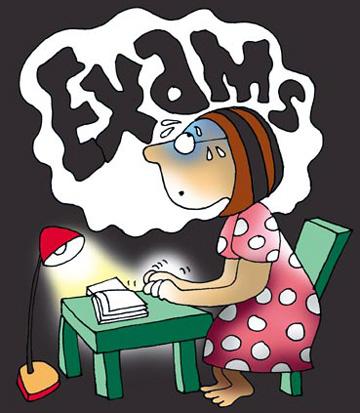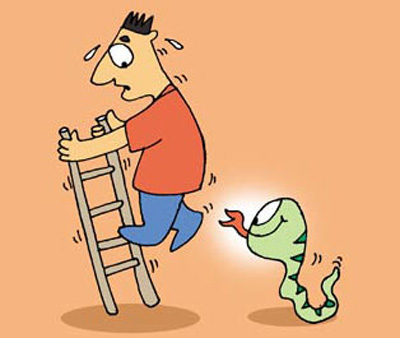 | « Back to article | Print this article |
DOs and DONTs to cope with exam anxiety
Students must pay attention to their health and avoid discussing each paper after the exam says Dr Samir Parikh, behavioural sciences expert from Fortis Hospital.
Every year between February and March one gets to see the lingering silence at home, dust laden TV sets and desolated play stations.
The houses which once echoed with tattering all day long bears absolute quietus, for it's the time of the year when being a student becomes treacherous, and braving the boards is more like wining a battle, there is no place for a defeat.
However what comes along complimentary is the bountiful stress, making this phase nothing less than a torture.
Over 80 per cent students report significant exam anxiety before exams.
The number of students coming for psychiatrist consults goes up substantially indicating that exam days are crucial both for the students and their family, as one bad exam, can tremendously drop the confidence of the child, worsening his coming exams.
Here, Dr Samir Parikh, Director, Department of Mental Health and Behavioural Sciences, Fortis Hospital enlists the following tips to be followed prior to the exam day, in order to cope with the gregarious stress and nervousness.
Illustration: Uttam Ghosh
ALSO READ: Top 5 mistakes students make in a board exam
Please click NEXT to continue reading...
DOs and DONTs to cope with exam anxiety
Before entering exam hall
Stop reading
Talk to friends, but do not talk studies.
Minimise waiting time outside hall.
Speak positive to yourself. Say things like 'I am well prepared, I will do well'.
In the hall...
Settle and compose yourself.
Set your table.
Do a short relaxation routine.
If you are having anxiety symptoms, remind yourself that this is natural, and ignore these sensations and focus on your task.
Do not hurry into reading the question paper.
Time yourself: Be cost effective with time.
Feel comfortable and start your answers.
If you do not know a question, don't waste time. Move on to the next after leaving some space, you can try it later.
Leave space after each answer so at end if you want to add something you could do so.
Do not be in a hurry, this is not a race.
Do not bother as to how many supplementary sheets others are taking.
Try and revise at the end.
When you are out of the hall...
Avoid post mortem of the paper.
Leave for home, avoid study discussions.
Relax at home.
Give yourself a break.
Start studies when you are comfortable.
Illustration: Dominic Xavier
DOs and DONTs to cope with exam anxiety
What to do when you have breaks between two exams...
Focus on basic study skills.
Indulge in short spurts of reading with breaks.
Perform attention, concentration exercises.
Avoid exertion.
Read through notes.
Focus on the subject at hand.
Take care of your health and lifestyle.
Don't under sleep.
Maintain regular sleep-awake pattern.
Indulge in an outdoor activity at least one hour per day.
Continue talking to friends.
Spend time with family.
Don't stop enjoying.
Avoid coffee, smoking and self-medications.
Find solutions to your problems.
Talk to your subject teacher if you face doubts.
Talk to your school counsellor if there is anxiety.
Share your thoughts with parents and friends.
Illustration: Dominic Xavier
DOs and DONTs to cope with exam anxiety
What to do if your paper doesn't go well
Marks are calculated in aggregate, so performance in one paper alone does not matter
Instead, focus on the next paper
Do not discuss the last exam
If you are feeling low, anxious or upset, talk it out
Remember your exam is a part of life, and tests come throughout life. Each exam is a learning stage of life.
So no exam is the last or THE exam.
At the end of the day your attitude and approach to the exam matters the most.
Focus on performance and you would get your desired result.
Illustration: Uttam Ghosh



